|
By Dr. Keith Wilson
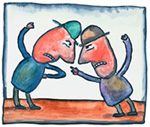
I am often asked what it really looks like when parents get stuck in the Intensity Web. The following examples shows how parents can get caught up in their children's soccer game and lose focus, dramatically increasing the chances that they will act in ways that do not reflect their values.
More >>
|
|
Nearly 5 million children in this country suffer from asthma. Without immediate treatment to keep a child's airways from constricting, asthma can be fatal.
Even if only mildly asthmatic, a child can suffer a fatal asthma attack playing sports. A report in the February 2004 issue of The Journal of Allergy and Clinical Immunology found that
More >>
|
|
Hydration Essentials
Sponsored by SunnyD
|
|
By Suzanne Nelson, D.Sc., R.D.
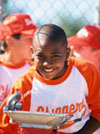
Because children tolerate heat and humidity less well than adults, there may be times when it will be necessary to modify or even cancel practices due to extremely hot or humid conditions. In deciding whether to do so, you should keep in mind the following.
More >>
|
|
By Brooke de Lench
Too often these days, parents feel they have no choice but to pack their child's schedules with adult-supervised, adult-driven activities such as organized sports. But, as a new report from the American Academy of Pediatrics (AAP) makes clear, such activities should not come at the expense of free and unstructured play, which is critical to healthy child development.
More >>
|
|
By Dr. Keith Wilson
It might seem a little odd to think about a ten year old baseball player with performance anxiety. We usually reserve that term for adult players who choke under pressure. However, consider whether you have seen these situations with your young player or one that you know.
More >>
|
|
By Shane Murohy, Ph.D.
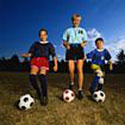 An interesting and useful way of thinking about the development of the young athlete has been proposed by Jon Hellstedt. Because it is impossible to look at the development of the young athlete without also taking into account the changes experienced by the parents and siblings, Hellstedt looks at the development of the young athlete as an issue for the entire family. More >> |
|
By Shane Murphy, Ph. D.
If you have spent a lot of time as a youth sport parent during the past year (as I have), you probably feel a bit battered and bruised right now. It seems that everyone is ready to blame "out-of-control parents" for all the ills of youth sports. We are the crazy ones screaming on the sidelines, abusing the kids, yelling at the officials, and displaying poor sportsmanship. What's a parent to do? More >>
|
|
 With the Games Based Approach to teaching sports, all aspects of the sport, from the basic skills to more technical moves and strategies, are taught in the context of fun, yet instructive, games.
More >> With the Games Based Approach to teaching sports, all aspects of the sport, from the basic skills to more technical moves and strategies, are taught in the context of fun, yet instructive, games.
More >>
|
|
By Brooke de Lench
Jill had always been a gifted athlete. She had been the top scorer for her youth soccer team since first grade and her skills were head and shoulders above her peers. Unfortunately, her parents also stood out. More >>
|
|
by Paige Stoyer
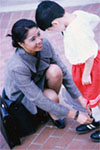 Dr. Carol Frey, Assistant Professor of Orthopedic Surgery at UCLA and Chief of Foot and Ankle Surgery at West Coast Sports Performance in Manhattan Beach, California, says parents should remember the following when shopping for their children’s shoes.
More >> Dr. Carol Frey, Assistant Professor of Orthopedic Surgery at UCLA and Chief of Foot and Ankle Surgery at West Coast Sports Performance in Manhattan Beach, California, says parents should remember the following when shopping for their children’s shoes.
More >>
|
|
By Doreen Greenberg, Ph.D.
Since the passage of Title IX in 1972, the number of girls playing sports has gone from one in twenty-five to one in three.
Yet some people still cling to the notion that girls are simply not as interested in sports as boys. Research by the Women's Sports Foundation, however, proves otherwise: a recent study of pre-adolescent boys and girls (those between the ages of 6 and 9), shows that they are equally interested in playing sports. More >>
|
|
For a complete list of articles on Nutrition, click here
|
|

|
|
At this age, kids are beginning to get the hang of it, becoming more coordinated and team-oriented. Though the emphasis is still largely on having fun and skill development, the trend is more and more towards winning, specialization, and competition. Is that a good thing? Is this the time for your child to pick a sport to begin playing year round? Is specialization necessary? Healthy? When winning comes at the expense of your child's playing time, what can you do? In articles, columns and Q & A's, MomsTeam experts and professionals help parents navigate the increasingly competitive world of youth sports for the eight to ten year old. Have a story, advice or point of view to share with other moms about your experiences? Email us .
|

|
By Shane Murphy, Ph. D.
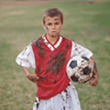 There is a strong tendency in our society to view participation in sports in the most favorable light. Children are encouraged to participate in organized youth sports programs because they are thought to promote such fundamental values as character, teamwork, determination and commitment. But this bias can be troublesome if it prevents us from seeing that problems in youth sports exist. More >> There is a strong tendency in our society to view participation in sports in the most favorable light. Children are encouraged to participate in organized youth sports programs because they are thought to promote such fundamental values as character, teamwork, determination and commitment. But this bias can be troublesome if it prevents us from seeing that problems in youth sports exist. More >>
|
|
By Lindsay Barton
James R. Tavares was the coach of a highly successful amateur basketball team in Massachusetts for players aged 13 to 17. Scores of his players had earned basketball scholarships at Division I colleges. But Tavares had a secret: an arrest record for sex offenses and an alleged history of sexually inappropriate conduct towards some of his players. More>>
|
|
SAFE BACKCOUNTRY HIKING:
RETIRED NATIONAL PARK RANGERS
OFFER FIVE TIPS TO REDUCE INJURIES, SAVE LIVES More >>
|
|
By Shane Murphy, Ph. D.
A Parent's Greatest Strength And Weakness
It is no easy task to be a parent of a young athlete. Hard enough are the tasks of helping the child learn how to handle the ups and downs of competition. But perhaps most challenging are the demands on your own coping skills - learning how to manage emotions that are repeatedly tested under trying conditions.
More >>
|
|
By Dr. Keith Wilson
Many factors contribute to being a successful athlete, including physical skill and good coaching. Yet the primary reason players succeed in sports is they have a love for the game. More >>
|
|
 Contrary to what you might think, your child's natural flexibility varies by age. Children aged 10 and up start to lose flexibility because their bones are growing faster than their muscles.
More >> Contrary to what you might think, your child's natural flexibility varies by age. Children aged 10 and up start to lose flexibility because their bones are growing faster than their muscles.
More >>
|
|
By Lindsay Barton
In an episode of the popular NBC series "ER", Doctor Mark Green watched as his 10-year old daughter dove to make a save in a youth soccer game, slammed headfirst into the goal post, and was temporarily knocked unconscious. Running on to the field to attend to his daughter, Dr. Green called for the first-aid kit. The coach admitted that he didn't have one! More >>
|
|
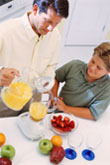 A new, first-of-its-kind survey conducted for the American Dietetic Association's sports nutrition practice group, SCAN (Sports, Cardiovascular and Wellness Nutritionists), finds that many parents are confused about the right foods and fluids to give their kids who play sports. More >> A new, first-of-its-kind survey conducted for the American Dietetic Association's sports nutrition practice group, SCAN (Sports, Cardiovascular and Wellness Nutritionists), finds that many parents are confused about the right foods and fluids to give their kids who play sports. More >>
|
|





























































 An interesting and useful way of thinking about the development of the young athlete has been proposed by Jon Hellstedt. Because it is impossible to look at the development of the young athlete without also taking into account the changes experienced by the parents and siblings, Hellstedt looks at the development of the young athlete as an issue for the entire family.
An interesting and useful way of thinking about the development of the young athlete has been proposed by Jon Hellstedt. Because it is impossible to look at the development of the young athlete without also taking into account the changes experienced by the parents and siblings, Hellstedt looks at the development of the young athlete as an issue for the entire family.  With the Games Based Approach to teaching sports, all aspects of the sport, from the basic skills to more technical moves and strategies, are taught in the context of fun, yet instructive, games.
With the Games Based Approach to teaching sports, all aspects of the sport, from the basic skills to more technical moves and strategies, are taught in the context of fun, yet instructive, games.
 Dr. Carol Frey, Assistant Professor of Orthopedic Surgery at UCLA and Chief of Foot and Ankle Surgery at West Coast Sports Performance in Manhattan Beach, California, says parents should remember the following when shopping for their children’s shoes.
Dr. Carol Frey, Assistant Professor of Orthopedic Surgery at UCLA and Chief of Foot and Ankle Surgery at West Coast Sports Performance in Manhattan Beach, California, says parents should remember the following when shopping for their children’s shoes.

 There is a strong tendency in our society to view participation in sports in the most favorable light. Children are encouraged to participate in organized youth sports programs because they are thought to promote such fundamental values as character, teamwork, determination and commitment. But this bias can be troublesome if it prevents us from seeing that problems in youth sports exist.
There is a strong tendency in our society to view participation in sports in the most favorable light. Children are encouraged to participate in organized youth sports programs because they are thought to promote such fundamental values as character, teamwork, determination and commitment. But this bias can be troublesome if it prevents us from seeing that problems in youth sports exist. 


 Contrary to what you might think, your child's natural flexibility varies by age. Children aged 10 and up start to lose flexibility because their bones are growing faster than their muscles.
Contrary to what you might think, your child's natural flexibility varies by age. Children aged 10 and up start to lose flexibility because their bones are growing faster than their muscles.
 A new, first-of-its-kind survey conducted for the American Dietetic Association's sports nutrition practice group, SCAN (Sports, Cardiovascular and Wellness Nutritionists), finds that many parents are confused about the right foods and fluids to give their kids who play sports.
A new, first-of-its-kind survey conducted for the American Dietetic Association's sports nutrition practice group, SCAN (Sports, Cardiovascular and Wellness Nutritionists), finds that many parents are confused about the right foods and fluids to give their kids who play sports. 



